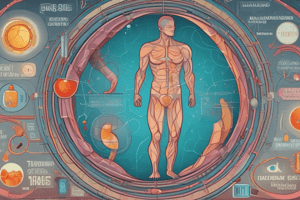Podcast
Questions and Answers
What percentage of diabetes patients are typically diagnosed with type 2 diabetes?
What percentage of diabetes patients are typically diagnosed with type 2 diabetes?
- 75%
- 95%
- 90% (correct)
- 50%
Which of the following statements accurately describes typical patients with type 2 diabetes?
Which of the following statements accurately describes typical patients with type 2 diabetes?
- Most patients are under 30 years old.
- Patients usually have some degree of insulin resistance. (correct)
- Patients often have a normal body weight.
- Patients are predominantly diagnosed with type 1 diabetes.
A condition where blood glucose levels are elevated but do not meet the criteria for diabetes is known as?
A condition where blood glucose levels are elevated but do not meet the criteria for diabetes is known as?
- Diabetic ketoacidosis
- Metabolic syndrome
- Prediabetes (correct)
- Hypertension
What is the typical range for fasting blood sugar levels in someone with impaired fasting glucose (IFG)?
What is the typical range for fasting blood sugar levels in someone with impaired fasting glucose (IFG)?
Which of the following best describes the progression of type 2 diabetes?
Which of the following best describes the progression of type 2 diabetes?
What is a primary characteristic of insulin resistance syndrome?
What is a primary characteristic of insulin resistance syndrome?
Which hormone continues to be produced by the pancreas in individuals with type 2 diabetes?
Which hormone continues to be produced by the pancreas in individuals with type 2 diabetes?
Which of the following correctly describes the typical onset of type 2 diabetes?
Which of the following correctly describes the typical onset of type 2 diabetes?
What percentage of type 2 diabetes patients are typically classified as overweight?
What percentage of type 2 diabetes patients are typically classified as overweight?
What is a common complication associated with insulin resistance syndrome?
What is a common complication associated with insulin resistance syndrome?
What is the primary effect of insulin on glycogen metabolism?
What is the primary effect of insulin on glycogen metabolism?
Which of the following tissues is NOT insulin-dependent for glucose uptake?
Which of the following tissues is NOT insulin-dependent for glucose uptake?
What is a consequence of high levels of insulin in the body?
What is a consequence of high levels of insulin in the body?
Which enzyme is increased in activity due to insulin's effect on glycolysis?
Which enzyme is increased in activity due to insulin's effect on glycolysis?
What substance is decreased due to insulin's effect on gluconeogenesis?
What substance is decreased due to insulin's effect on gluconeogenesis?
Which of the following is NOT a biological effect of insulin?
Which of the following is NOT a biological effect of insulin?
What metabolic process is primarily stimulated by insulin in adipose tissue?
What metabolic process is primarily stimulated by insulin in adipose tissue?
Which condition is characterized by islet cell tumors producing excessive insulin?
Which condition is characterized by islet cell tumors producing excessive insulin?
What percentage range of women with gestational diabetes might develop type 2 diabetes after pregnancy?
What percentage range of women with gestational diabetes might develop type 2 diabetes after pregnancy?
Which genetic condition commonly associated with diabetes results from mutations that lead to insufficient insulin release?
Which genetic condition commonly associated with diabetes results from mutations that lead to insufficient insulin release?
What is the primary health risk associated with prediabetes beyond progressing to diabetes?
What is the primary health risk associated with prediabetes beyond progressing to diabetes?
Which statement is true regarding Latent Autoimmune Diabetes in Adults (LADA)?
Which statement is true regarding Latent Autoimmune Diabetes in Adults (LADA)?
What is a key characteristic that distinguishes MODY from other types of diabetes?
What is a key characteristic that distinguishes MODY from other types of diabetes?
What primary factor leads to hyperglycemia as seen in diabetes mellitus?
What primary factor leads to hyperglycemia as seen in diabetes mellitus?
Which hormone is directly stimulated by hypoglycemia to raise blood sugar levels?
Which hormone is directly stimulated by hypoglycemia to raise blood sugar levels?
What condition is indicated by the presence of glucose in the urine?
What condition is indicated by the presence of glucose in the urine?
Which class of drugs is used to promote endogenous insulin secretion in diabetes treatment?
Which class of drugs is used to promote endogenous insulin secretion in diabetes treatment?
What term describes the excessively high levels of blood glucose above 120 mg per 100 ml?
What term describes the excessively high levels of blood glucose above 120 mg per 100 ml?
What underlying issue leads to the chronic hyperglycemia observed in diabetes mellitus?
What underlying issue leads to the chronic hyperglycemia observed in diabetes mellitus?
Which of the following is NOT a symptom of hypoglycemia?
Which of the following is NOT a symptom of hypoglycemia?
What does the term 'diabetes mellitus' literally refer to?
What does the term 'diabetes mellitus' literally refer to?
What is the renal threshold for glucose excretion?
What is the renal threshold for glucose excretion?
What plays a crucial role in the compensatory reactions of hypoglycemia?
What plays a crucial role in the compensatory reactions of hypoglycemia?
What mechanism increases blood sugar levels during sympathetic nerve stimulation?
What mechanism increases blood sugar levels during sympathetic nerve stimulation?
What is the renal threshold for glucose, indicating when glucose will start leaking into the urine?
What is the renal threshold for glucose, indicating when glucose will start leaking into the urine?
What physiological response occurs when blood sugar levels are elevated?
What physiological response occurs when blood sugar levels are elevated?
Which factor is NOT considered when assessing hypoglycemic symptoms?
Which factor is NOT considered when assessing hypoglycemic symptoms?
What is the maximum ability of renal tubules to reabsorb glucose per minute known as?
What is the maximum ability of renal tubules to reabsorb glucose per minute known as?
What is the primary effect of hyperglycemia on the secretion of growth hormone?
What is the primary effect of hyperglycemia on the secretion of growth hormone?
What is the typical symptom of hypoglycemia that affects nerve cells most directly?
What is the typical symptom of hypoglycemia that affects nerve cells most directly?
How do tissue fluid and plasma glucose levels relate to each other?
How do tissue fluid and plasma glucose levels relate to each other?
In individuals with diabetes, when do hypoglycemic symptoms typically start?
In individuals with diabetes, when do hypoglycemic symptoms typically start?
What is one way tissues utilize glucose aside from energy production?
What is one way tissues utilize glucose aside from energy production?
Flashcards are hidden until you start studying
Study Notes
Glutathione Insulin Transhydrogenase (Insulinase)
- Insulinase plays a role in regulating insulin and glucose profiles in non-diabetic individuals across meal times.
- Insulin levels peak post-meal to facilitate glucose uptake and prevent excessive blood sugar elevation.
Normal Insulin Metabolism
- Post-meal insulin action includes:
- Storing glucose as glycogen.
- Inhibiting gluconeogenesis.
- Enhancing fat storage in adipose tissue.
- Increasing protein synthesis.
Biological Effects of Insulin
- Promotes cell growth and development, mediated by factors like epidermal growth factor and prostaglandins.
Regulation of Insulin Secretion
- Insulin secretion is stimulated by rising blood glucose levels after meals.
Effects of Insulin on Carbohydrate Metabolism
- Enhances glucose uptake in:
- Skeletal and cardiac muscles.
- Adipose tissue.
- Mammary glands.
- Tissues that are independent of insulin for glucose uptake:
- Brain, red blood cells (RBC), testis, kidneys, retina, intestinal mucosal cells.
Carbohydrate Metabolism Enzyme Activity
- Glycolysis: Increased activity of glucokinase, phosphofructokinase, and pyruvate kinase.
- Glycogenesis: Increased glycogen synthase.
- HMP shunt: Increased glucose 6-phosphate dehydrogenase.
- Gluconeogenesis: Decreased activity of key gluconeogenesis enzymes.
- Glycogenolysis: Decreased glycogen phosphorylase activity.
Lipid Metabolism
- Lipogenesis is increased, promoting:
- De novo fatty acid synthesis via acetyl CoA carboxylase.
- Availability of NADPH.
- Adipose tissue support for lipoprotein lipase activity increases.
- Lipolysis is decreased, affecting hormone-sensitive lipase.
- Ketogenesis is inhibited.
Protein Metabolism
- Protein synthesis is enhanced through:
- Increased RNA polymerase activity and amino acid uptake.
- Protein degradation is inhibited by decreased transaminases and deaminases.
Adverse Effects of Insulin
- Potential negative effects include:
- Hypoglycemia, lipoatrophy, lipohypertrophy, obesity.
- Insulin allergy and formation of insulin antibodies.
- Insulin-induced edema.
Diabetes Symptoms and Classification
- Primary symptoms of diabetes include frequent urination, excessive thirst, hunger, weight loss, fatigue, and vision impairment.
- Diabetes mellitus is characterized by chronic hyperglycemia due to defects in insulin production or action.
Type 2 Diabetes Mellitus
- Typically affects individuals over 40 and is associated with obesity in 80-90% of cases.
- Insulin resistance is a key feature, leading to inadequate glucose utilization and persistent hyperglycemia.
- Precursor conditions include impaired glucose tolerance (IGT) and impaired fasting glucose (IFG).
Prediabetes
- A condition where blood glucose levels are elevated but not high enough for a diabetes diagnosis.
- Weight loss and increased physical activity can delay or prevent progression to diabetes.
Gestational Diabetes
- Diagnosed in some women during pregnancy, particularly those who are obese or have a family history of diabetes.
- Requires treatment during pregnancy to avoid complications in the infant.
Other Forms of Diabetes
- Includes types resulting from specific genetic conditions, surgery, drugs, or infections.
- Maturity-Onset Diabetes of the Young (MODY) arises from genetic mutations affecting insulin release and can arise at any age.
- Latent Autoimmune Diabetes in Adults (LADA) mimics type 2 diabetes initially but progresses quickly to insulin dependence in many cases.
Insulin and Hypoglycemia
- Hypoglycemia occurs when blood glucose levels drop below normal, leading to various nervous system symptoms.
- Symptoms of hypoglycemia can be relieved by administering glucose.
- Compensatory mechanisms include hormone secretion that opposes insulin to restore blood sugar levels.
Insulin Preparation
- Available in short-acting and long-acting formulations to manage blood glucose levels effectively.
Studying That Suits You
Use AI to generate personalized quizzes and flashcards to suit your learning preferences.



